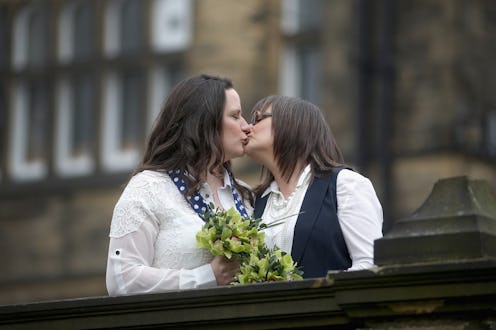News
The Bizarre Way Texas Clerks Might Avoid Issuing LGBT Marriage Certificates

Although same sex marriage has been the law of the land since 2015, Texas has nevertheless passed a bill that would allow county clerks to refuse to issue marriage certificates to LGBT couples if doing so would violate the clerk's "sincerely held religious belief." But that doesn't mean gay couples won't be allowed to get married at all. There's a bizarre way Texas clerks might avoid issuing marriage certificates to gay couples.
The legislation, which has passed the state Senate and now heads to the House, outlines a protocol by which same-sex couples can still be married, regardless of how other people feel about their marriage. If a clerk refuses to issue a marriage certificate, the responsibility would fall instead with a deputy clerk. If no deputy clerk is willing, a judge or magistrate would be tasked with issuing the certificate.
And if no judge or magistrate agrees to issue the certificate? That's where things get interesting. If that happens, then "the commissioners court shall designate one or more county employees or employ or contract with one or more individuals to provide those services as a certifying official," according to the text of the bill.
The key is that last phrase — "certifying official." If no county employees are willing to issue a marriage certificate to LGBT couples, the county will simply contract somebody else to act as the "certifying official," and that person will issue the certificate.
But how, exactly, does somebody become a "certifying official?" Bizarrely, the legislation outlines almost no qualifications one needs to fulfill in order to assume this role; it simply states that the certifying official "is not required to be an employee of the county," and that they won't be authorized to do anything other than issue marriage certificates. Even stranger, the bill allows the marriage certificate to be issued "in person or by telephone or electronic means." In totality, this could result in a rather surreal process, whereby gay couples are being issued a marriage license over the phone, with, essentially, a random person acting as the issuer.
To be sure, this odd arrangement would be preferable to same-sex couples being denied marriage licenses outright. And yet it's still incredibly problematic on multiple levels.
For one, forcing LGBT couples to go through a different process in order to be married reeks of the "separate but equal" argument used to justify anti-black discrimination in mid-20th century America. Moreover, allowing government employees to opt out of their duties due to religious beliefs (even sincerely held ones) flatly violates the separation of church and state.
Even worse, it opens the door for other types of discrimination that can be justified on the grounds of "religious beliefs" — for instance, if the bill passes, a clerk in Texas could potentially refuse to issue marriage certificates to interracial or interfaith couples, too, if the clerk says it conflicts with their sincerely held religious beliefs.
I suppose that in the strictest sense, it's mildly encouraging that Texas Republicans aren't trying to ban gay marriage completely, as many states had done prior to the landmark Supreme Court ruling that legalized marriage equality nationwide. But this bill is still very much an anti-LGBT bill.